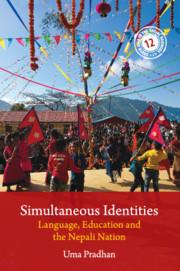Book contents
- Frontmatter
- Contents
- List of Figures
- List of Tables
- List of Appendices
- List of Abbreviations
- Acknowledgements
- Notes on the Use of Terms, Transliteration and Names
- Introduction: Language, Education and the Nepali Nation 1
- 1 Language, Education and State-Making in Nepal
- 2 Mother Tongue and the Construction of an Educated Person
- 3 Language, Public Space and Identity
- 4 Transforming Language to a Script
- 5 Language, Education and Knowledge-Making
- 6 Quality, Equality and Language Ideology
- 7 Ethnicity, Education and Employment
- Conclusion: Simultaneous Identities
- Appendices
- Glossary
- Bibliography
- Index
Conclusion: Simultaneous Identities
Published online by Cambridge University Press: 30 April 2020
- Frontmatter
- Contents
- List of Figures
- List of Tables
- List of Appendices
- List of Abbreviations
- Acknowledgements
- Notes on the Use of Terms, Transliteration and Names
- Introduction: Language, Education and the Nepali Nation 1
- 1 Language, Education and State-Making in Nepal
- 2 Mother Tongue and the Construction of an Educated Person
- 3 Language, Public Space and Identity
- 4 Transforming Language to a Script
- 5 Language, Education and Knowledge-Making
- 6 Quality, Equality and Language Ideology
- 7 Ethnicity, Education and Employment
- Conclusion: Simultaneous Identities
- Appendices
- Glossary
- Bibliography
- Index
Summary
This book presents ethnographic accounts of everyday practices in two mother tongue education schools in Nepal: JSB, Kathmandu, and JKHSS, Kapilvastu. My research was motivated by an interest to understand the ways in which ethnolinguistic identity plays out in everyday life. As discussed in earlier chapters, the category of ethnolinguistic identity is increasingly used to question inequalities underpinning the Nepali state, including its educational institutions. In this context, not only ethnic activists but also the state has put forward mother tongue education as one of the important agendas to address educational disparities in minority groups. Rather than looking at education as a top-down process, I have drawn attention to everyday cultural politics of language use inside minority language schools. I have approached mother tongue education that serves as a productive lens to understand the everyday negotiation in both sociopolitical and educational arenas. By paying close attention to language practices within mother tongue education in relation to the national education system, this book examines the ways in which different people understand, experience and interpret mother tongue education.
It has been my position throughout this book that the challenges faced by mother tongue education cannot be understood without taking into consideration the social meanings of education and ‘educated person’ and the larger processes of state- and nation-building in its production. I argue that in a heterogeneous context like Nepal, different identities have to be approached in relation to each other to appreciate the varying ways in which they are entangled with other identities and embedded within the asymmetries of language relations. The idea of assimilation–pluralism paradox has been an instructive vantage point to understand the complex entanglements of various identity positions and language use. This lens is also helpful in uncovering the tensions and contradictions inherent in education and especially in minority language education.
The contribution of this book lies in approaching education as a site of struggle, rather than a simplistic model of either education as development or education as domination, where various groups negotiate the contradictory resources to negotiate their positions in the social hierarchy.
- Type
- Chapter
- Information
- Simultaneous IdentitiesLanguage, Education, and the Nepali Nation, pp. 210 - 220Publisher: Cambridge University PressPrint publication year: 2020

